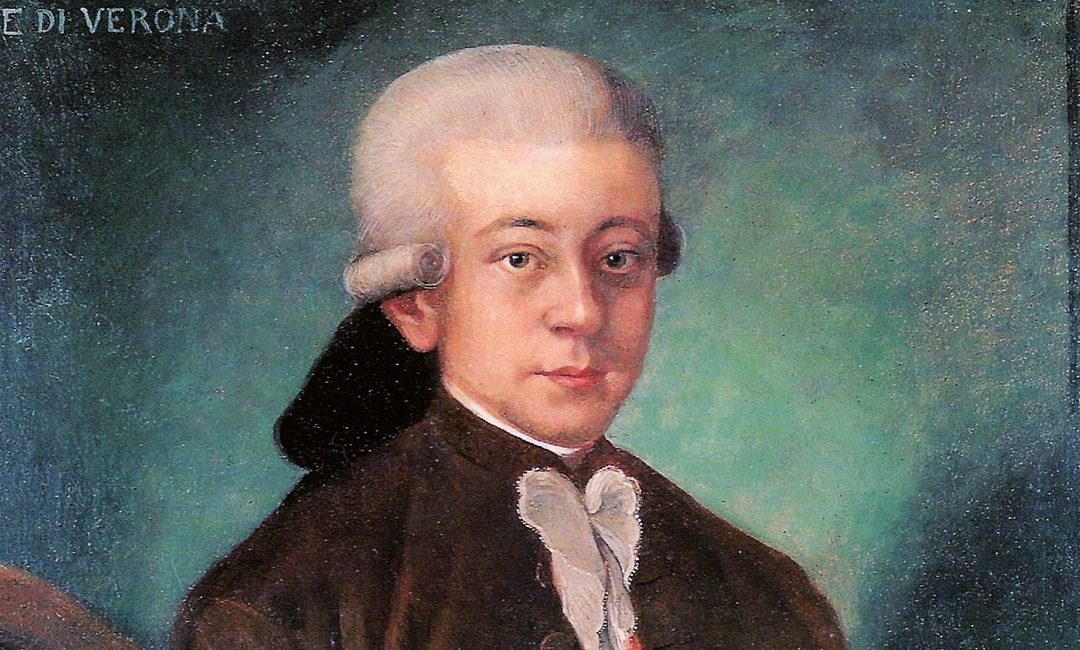Mozart’s Breakthrough
Part 3 of 5 of your Concert Notes
We’re following CPR Classical’s Great Composers Series on Mozart
We like to give you Concert Notes. Why? CPR Classical’s Scott O’Neil says it best…
“I’m convinced that the music itself has an inherent, aesthetic beauty to it, but when we understand the stories – certainly in the case of the tumultuous life of Wolfgang Mozart – but also the context that the music was written, not only do we understand the music better, but the music – the individual pieces themselves – sound more beautiful.”
After looking for work in Mannheim and Paris, then his mother dying, Mozart returns home to Salzburg. He publishes nothing significant for nearly 6 months, then writes his very beautiful Coronation Mass.
However, Prince-Archbishop Colloredo of Salzburg is no fan. He thinks the Mozart family is ‘too big for their britches’, especially, young Wolfgang. He wants to reign in Wolfgang and his family. With Leopold also keeping Wolfgang under his thumb, Wolfgang is foiled at every turn. He’s back in Salzburg at age 23, working for an archbishop, consigned to writing serenades and masses. Things haven’t gone as Wolfgang wants. His real love is opera, and he wants to leave Salzburg.
Wolfgang lands a commission from Munich to write an opera, which is great news. He pens his opera Idomeneo. It’s written in just a couple of weeks. Wolfgang writes and rewrites passages with a dear family friend, tenor Anton Raath in mind. Anton doesn’t have the range and power he once had. Wolfgang wrote a song for Anton back in Paris when his mother had died, as Anton was there. Wolfgang takes great care to hide weaknesses in Raath’s voice while magnifying his strengths. In this work, Anton sounds fantastic. Tailoring arias to individual singers’ voices becomes a trademark of Wolfgang’s.
Leopold’s interference continues and ramps up. He meddles not only in Wolfgang’s personal affairs, but also in his musical compositions. Leopold writes,
“I advise you when composing to consider not only the musical but also the unmusical public. You must remember that for every 10 real connoisseurs there are 100 ignoramuses. So do not neglect the so-called popular style, which tickles long ears.”
(By referring here to ‘long ears’, he’s actually referring to that audience as jackasses.)
The letters between Leopold and Wolfgang begin to show the change in their relationship. Wolfgang rejects his father’s compositional and personal advice, and even throws a guilt trip back on his father. He tells Leopold that he is only staying in Salzburg for his father’s sake, even rebuking Leopold as he says,
“I beg you, don’t send me such sad letters anymore. I know it, and by God, I feel it, how much you deserve some hours of peace. But am I the problem? And you know, dearest father, that I am remaining in Salzburg only for your sake. For God knows, if had to worry only about myself, I would have wiped my behind with the most recent contract they gave me.”
Gone is the submissive tone from Wolfgang in his letters to Leopold, but this is just a prelude.
Idomeneo is a huge success, and an even bigger opportunity presents itself in the capital. Joseph the 2nd is about to be crowned Emperor, with a huge coronation planned. Archbishop Colloredo takes Mozart, more or less to show him off – yet still won’t allow him to play on his own. Colloredo controls whether Wolfgang plays at all, since Wolfgang is more or less his servant. On one occasion Wolfgang misses the opportunity to play for the Emperor – when he could have made half a year’s salary in a single night – because Colloredo wouldn’t allow Wolfgang to perform. Wolfgang furiously writes Leopold,
“Just think what I could earn if I was able to give a concert for my own benefit, now that the public knows me. But that arch-boobie of ours won’t allow it!”
Colloredo then assigns Wolfgang to write a serenade as background music for a party. Mozart unexpectedly writes a very beautiful work, his ‘Gran Partita’, Serenade No. 10 in B-flat Major, K. 361. Here’s an excerpt performed by members of the Berlin Philharmonic:
It’s an humble serenade in the form of an instrumental opera, the form of music he really loves. Wolfgang’s music has a tremendous effect on his audience, and it’s a bit of a win in the ongoing battle against Colloredo.
Mozart is invited to participate in a benefit concert for the widows of musicians. It pays nothing, but will be great exposure and would be very poor form to decline the invitation. However, Colloredo unexpectedly declines the invitation. Wolfgang tells others that he’s sorry, but Colloredo won’t let him participate. The other noblemen then shame Colloredo into allowing Wolfgang to participate after all. People begin to realize how Colloredo is suppressing Wolfgang.
Wolfgang’s music is played at the benefit by the largest orchestra he’s heard play his music to this point, in a large setting, before a large audience of important people – rulers from all over Europe. It is a huge success, and Wolfgang loved the performance, proclaiming it ‘magnifique’.
Leopold tries to temper Wolfgang’s expectations due to the huge success, saying it won’t last and the Vienna will soon want something new. But Wolfgang thinks that Leopold’s comments may apply only to the theater. Wolfgang refers to Vienna as the ‘city of the keyboard’ as he begins to notice the popularity of piano concerts at small audiences around the city. He gets the idea that he could make enough on his own to support himself through these concerts. This is unheard of at the time for a composer not to work for an employer. But Wolfgang is dreaming big.
Leopold starts to take Colloredo’s side in arguments against Wolfgang. Wolfgang responds in his letters to his father,
“Have some faith in me! I’m not a fool anymore, and that I should be a Godless, ungrateful son!”
Wolfgang is asking his father to give him a chance. Wolfgang recognizes Vienna is a keyboard land, and he Europe’s greatest keyboardist. He’s the right person, in the right place, at the right time. He must take the opportunity. But there’s a wrinkle: he’s under contract to Colloredo in Salzburg.
Wolfgang does whatever it takes to get out of his contract. He so frustrates Colloredo that he releases him from his contract, with an escort to the door and a literal kick to Wolfgang’s rear end by Count Arco. It marks a line Wolfgang crosses, to move on & never look back. Wolfgang is now the first freelance composer in history.
Wolfgang then pens ‘The Abduction from the Seragio’, an opera in German – not the aristocrat-preferred Italian. The average person could not understand Italian, so Wolfgang is trying to appeal more to the people, to become ‘the people’s composer’.
Soon, Wolfgang falls in love with Constanze Weber (sister of his love Aloysia from Mannheim), who is now a professional soprano, & plans to marry her. Leopold interferes, even trying to get both Constanze’s mother & her guardian thrown in prison. Leopold warns of disinheritance – an irony, because Leopold himself was disinherited by his parents. Wolfgang marries her anyway on August 4, 1782.
Wolfgang’s & Leopold’s relationship is deteriorating as Wolfgang’s career grows, yet Wolfgang still wants to patch things up with Leopold. Wolfgang goes to Salzburg with Constanze and writes a mass to communicate with his father. It’s his Great Mass, Mass in C Minor, K. 427. Listen to the Kyrie movement here:
The choir first sings the opening Kyrie Eleison, and you can hear the struggle in their voice. Then the solo soprano enters to sing the Christe Eleison, Constanze in this case, and the music turns comforting. Wolfgang is trying to convey that in the midst of a troubling, stormy environment, Constanze provides him a ray of hope and order. It’s Wolfgang speaking the language of music directly to Leopold: Constanze is not adding to the chaos; she provides hope and order. Leopold is not won over.
At the Mozart family home, Constanze sees all the treasures Wolfgang has won over the years, many treasures. She asks to take one back with them to Vienna. Leopold refuses, responding with the reminder that he warned Wolfgang that marrying her meant Wolfgang was on his own. He gives her nothing. The close, endearing relationship Wolfgang & Leopold once enjoyed when Wolfgang was young is no more.
Upon return to Vienna, Wolfgang rights a flurry of piano concertos – 15 piano concertos in 5 years which are included in the standard repertoire today. This feat remains unequaled. The development of the piano happily coincides with Wolfgang’s time in Vienna. Keyboards at the time were either harpsichords or had too little volume to be heard over an orchestra. But now Wolfgang has pianos that can be used with orchestras, and he essentially creates a new genre: the modern piano concerto. Wolfgang sets our assumptions of what a piano concerto ought to be, even though others were written previously (by Haydn, for example). Such as his famed Piano Concerto No. 20 in D Minor, K. 466, here conducted and performed on the piano by Arthur Rubinstein:
Mozart’s dreams are finally coming true. The success he’s enjoying, especially being a freelance composer is inconceivable at the time. But, Leopold’s warnings about the fickleness of the Viennese loom, even with Wolfgang’s popularity at the piano.
Right now, all is well – but it’s not to last for long.
More tomorrow!
—
This concert week, we’re listening to CPR Classical’s podcast series on Mozart. You can find the entire series here: http://www.cpr.org/classical/podcast/cpr-the-great-composers. Read along as we write excerpts from this podcast.
Featured image credit: Portrait of the young Mozart, 1770, attributed to Martini Bologna; International museum and library of music [Public domain], via Wikimedia Commons – https://commons.wikimedia.org/wiki/File%3AMartini_bologna_mozart_1777.jpg
##
The Longmont Chorale performs, “Requiem: Mozart’s Last Words” on Sunday, March 11, 2018 at 3PM at LifeBridge Christian Church in Longmont. The Chorale and guest soloists are accompanied by instrumentalists from the Longmont Symphony Orchestra.
The Longmont Chorale is a nonprofit Longmont choral group, an SATB choir which performs four major concerts in Longmont each season. Concert tickets and information are both available at LongmontChorale.org/Tickets.
Like this post? Share it with a friend, using the social media bar on the side of this page (desktop) or below (mobile).


